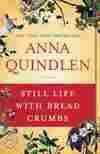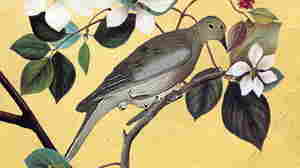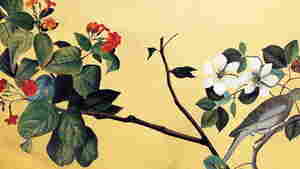Still Life With Bread Crumbs
Other editions available for purchase:
NPR Summary
Abandoning her expensive world to move to a small country cabin, a once world-famous photographer bonds with a local man and begins to see the world around her in new, deeper dimensions while evaluating second chances at love, career and self-understanding.
Genres:
Awards and Recognition
14 weeks on NPR Paperback Fiction Bestseller List
12 weeks on NPR Hardcover Fiction Bestseller List
NPR stories about Still Life With Bread Crumbs
Note: Book excerpts are provided by the publisher and may contain language some find offensive.
Excerpt: 'Still Life With Bread Crumbs'
Rebecca didn't have a copy of the poster herself. She hadn't even seen one for years, unless you counted a glimpse of it on a wall in a movie about a bunch of women sharing a house and discovering their own self-worth through yoga and sex. (In her defense, she had seen the movie on a plane, and hadn't been paying much attention.) But for years she had lived off it and its satellites, the reprints and licensing, as well as its free-floating reputation. It had paid for Ben's boarding school tuition, paid for the roomy apartment she'd moved them into after the divorce and had just sublet, paid for trips to Paris (for the Musée d'Orsay) and London (for the Tate Modern). It had paid her restaurant bills and her hairdresser tips and she hadn't even really noticed how much money it brought in until it started to dry up and then disappeared.
Her second show of photographs had been called the Kitchen Counter series, and it was seen as an iconic moment in women's art. But in fact at the time she took those photographs Rebecca had just been tired, tired in that way a woman with a child and a husband and a house and a job and a life gets tired, so that it feels like a mild chronic illness. She had been thirty-six years old and had a toddler and a husband who was contemptuous of husbands who helped around the house. "Peter is so European," women would say, and later Rebecca wondered if that was their way of telling her that he slept around. But that was later.
One evening Benjamin had had an ear infection, and by the time she had gotten him dosed with bubble-gum-flavored antibiotic and settled down in his crib Peter had shown up with two assistant professors and their spouses. That had been one of his favorite tricks, to show up with dinner guests unannounced, the guests apologetic, Peter not a bit, as though it was a test for her, to see what she could manage. "I'm surely not expected to ask if I can bring guests to my own home?" he had said one night when she had complained.
After everyone had staggered away tipsy into the night, calling compliments on the osso buco (in the freezer for exactly this purpose) and the flourless chocolate cake (ditto) over their tweedy shoulders, Peter had gone right to bed, once again confident that a kitchen magically cleaned itself sometime in the witching hours between brandy and breakfast. Rebecca had needed a moment before she started on the dishes and had lain down on their new modern couch, with its tubular frame and clean square lines, so uncomfortable that only a person as weary as she was could fall asleep there. At dawn a thin needle of sunlight through the living room window woke her even before Benjamin was screaming to be set free, and she had picked up her new Hasselblad, a gift from her father, and started to take pictures.
She never really knew why, why that, why then. The truth was she never had known, before or after. Talking about art requires artists to sound purposeful and sure of themselves, but she'd never felt that way. Over the years she'd made up a lot of reasons because people didn't seem to like the arbitrariness of the reality. They also didn't believe that she'd simply photographed what was already there — a bottle lying on its side with a puddle of olive oil shimmering along its curved lip, a handful of greasy forks glistening in the overhead lights, and, of course, what was later called Still Life with Bread Crumbs, a vaguely Flemish com- position of dirty wineglasses, stacked plates, the torn ends of two baguettes, and a dish towel singed at one corner by the gas stove.
From the book Still Life With Bread Crumbs by Anna Quindlen. Copyright 2014 by Anna Quindlen. Reprinted by arrangement with Random House, an imprint of The Random House Publishing Group, a division of Penguin Random House, Inc. All rights reserved.


